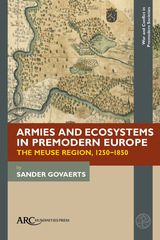
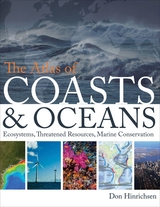
Oceans drive the world’s climate, nurture marine ecosystems full of aquatic life, and provide shipping lanes that have defined the global economy for centuries. And few realize that half of the world’s population lives in a coastal region within easy reach of one. Yet human activities such as commercial fishing, coastal real estate development, and industrial pollution have taken their toll on the seas. The first book of its kind, The Atlas of Coasts and Oceans documents the fraught relationship between humans and the earth’s largest bodies of water—and outlines the conservation steps needed to protect the marine environment for generations to come.
The Atlas offers a fascinating and often sobering account of how urbanization, climate change, offshore oil drilling, shipping routes, global tourism, and maritime conflict have had a profound impact on the world’s oceans and coasts. Combining text and images in visually engaging, thematically organized map spreads, this volume addresses the ecological, environmental, and economic importance of marine phenomena such as coral reefs, eroding shorelines, hurricanes, and fish populations—and how development threatens to destroy the ultimate source of all life on the “blue planet.” Lavishly illustrated with global and regional maps, from the Arabian Gulf to the Great Barrier Reef, from the Black Sea to the Mediterranean, and all the other major global waterways, The Atlas of Coasts and Oceans will be the definitive companion to any study of its subject for years to come.
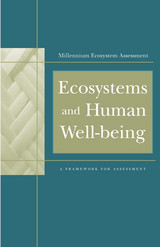
Ecosystems and Human Well-being is the first product of the Millennium Ecosystem Assessment (MA), a four-year international work program designed to meet the needs of decision-makers for scientific information on the links between ecosystem change and human well-being. The Millennium Ecosystem Assessment is modeled on the Intergovernmental Panel on Climate Change (IPCC) and will provide information requested by governments, through four international conventions, as well as meeting needs within the private sector and civil society. Ecosystems and Human Well-being offers an overview of the assessment, describing the conceptual framework that is being used, defining its scope and providing a baseline of understanding that all participants need to move forward.
The Millennium Ecosystem Assessment focuses on how humans have altered ecosystems, and how changes in ecosystems have affected human well-being. The assessment also evaluates how ecosystem changes may affect people in future decades and what responses can be adopted at local, national, or global scales to improve ecosystem management and thereby contribute to human well-being and poverty alleviation. The assessment was launched by United Nations Secretary-General Kofi Annan in June 2001, and the primary assessment reports will be released by Island Press in 2005.
The Millennium Ecosystem Assessment series is an invaluable new resource for professionals and policy-makers concerned with international development, environmental science, environmental policy, and related fields. It will help both in choosing among existing options and in identifying new approaches for achieving integrated management of land, water, and living resources while strengthening regional, national, and local capacities. The Millennium Ecosystem Assessment series will also improve policy and decision-making at all levels by increasing collaboration between natural and social scientists, and between scientists and policy-makers. Ecosystems and Human Well-being is an essential introduction to the program.
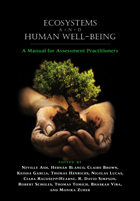
The manual is a stand-alone “how to” guide to conducting assessments of the impacts on humans of ecosystem changes. In addition, assessment practitioners who are looking for guidance on particular aspects of the assessment process will find individual chapters of this manual to be useful in advancing their understanding of best practices in ecosystem assessment. The manual builds on the experiences and lessons learned from the Millennium Ecosystem Assessment global and sub-global assessment initiatives, with chapters written by well-known participants in those initiatives. It also includes insights and experiences gained from a wider range of ecosystem service-focused assessment activities since the completion of the MA in 2005.
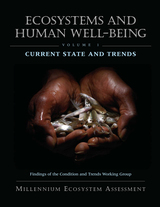
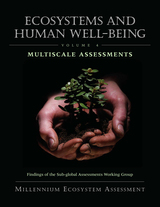
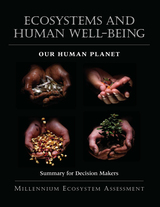
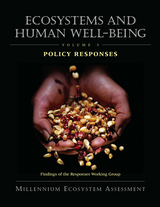
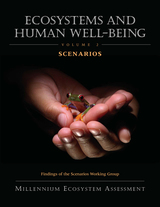
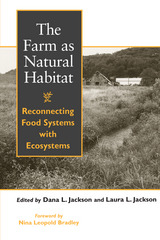
The Farm as Natural Habitat is a vital new contribution to the debate about agriculture and its impacts on the land. Arising from the conviction that the agricultural landscape as a whole could be restored to a healthy diversity, the book challenges the notion that the dominant agricultural landscape -- bereft of its original vegetation and wildlife and despoiled by chemical runoff -- is inevitable if we are to feed ourselves. Contributors bring together insights and practices from the fields of conservation biology, sustainable agriculture, and environmental restoration to link agriculture and biodiversity, farming and nature, in celebrating a unique alternative to conventional agriculture.
Rejecting the idea that "ecological sacrifice zones" are a necessary part of feeding a hungry world, the book offers compelling examples of an alternative agriculture that can produce not only healthful food, but fully functioning ecosystems and abundant populations of native species. Contributors include Collin Bode, George Boody, Brian DeVore, Arthur (Tex) Hawkins, Buddy Huffaker, Rhonda Janke, Richard Jefferson, Nick Jordan, Cheryl Miller, Heather Robertson, Carol Shennan, Judith Soule, Beth Waterhouse, and others.
The Farm as Natural Habitat is both hopeful and visionary, grounded in real examples, and guided by a commitment to healthy land and thriving communities. It is the first book to offer a viable approach to addressing the challenges of protecting and restoring biodiversity on private agricultural land and is essential reading for anyone concerned with issues of land or biodiversity conservation, farming and agriculture, ecological restoration, or the health of rural communities and landscapes.
READERS
Browse our collection.
PUBLISHERS
See BiblioVault's publisher services.
STUDENT SERVICES
Files for college accessibility offices.
UChicago Accessibility Resources
home | accessibility | search | about | contact us
BiblioVault ® 2001 - 2024
The University of Chicago Press









